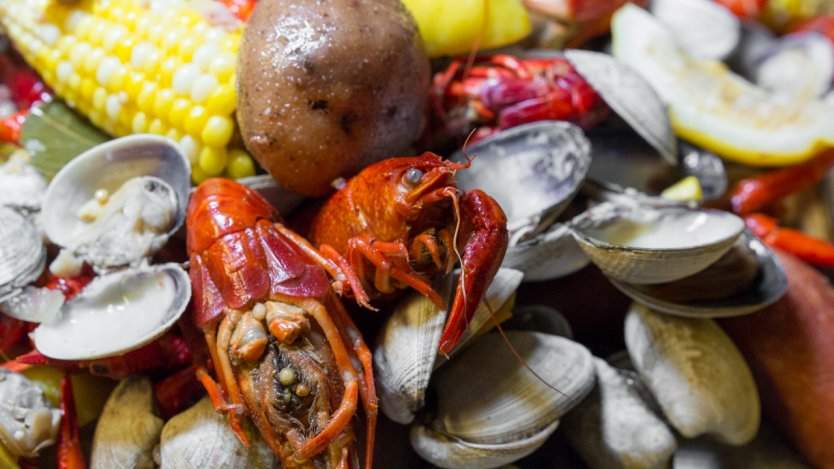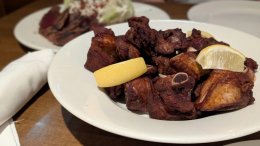Gathering two dozen of the world’s best chefs, shipping them off to the frozen wastes of Scandinavia, the forests of Japan or the wilds of South Carolina and leaving them to their own devices along with a small contingent of the world’s media, doesn’t cause a spontaneous devolution into a Top Chef/Lord of the Flies reality show.
Instead, it produces Cook it Raw.
This is not a pop-up; it’s not the usual collaboration; and it’s not a competition, which may surprise you when you hear the names of just some of the culinary heavyweights that have been associated with the event: Ferran Adria, Dan Barber, Rene Redzepi, April Bloomfield, Sean Brock and Magnus Nilsson.
This is the opportunity for chefs to explore alien and familiar surroundings, exchange ideas and experiment with their craft — sometimes ending in resounding success, other times ending in spectacular failure. Regardless of the outcome, no one plays it safe and every chef takes away a new outlook on food and often, themselves.
Started by Alessandro Porcelli, a Noma alumnus, Cook it Raw has just completed its sixth annual event, the first on North American soil. Three chefs represented Canada: John Jackson and Connie DeSousa of Charcut Roast House in Calgary, and Jeremy Charles of Raymonds in St. John’s, N.L.
Over the week, the group of chefs hunted gators, fished, farmed, picked rice, foraged for ingredients and dove into one of the few cuisines that can truly be called American: Lowcountry cuisine, a cooking style from the South Carolina Lowcountry. “[The experience] was a combination of being inspired and intimidated, from being surrounded by so many chefs for the first few days,” says Jackson, “After you start to have a dialogue, you find similarities and you discover you’re like-minded chefs there for the same reason: to learn something new, work with people, exchange ideas and build the culinary community.”
DeSousa was especially excited to work alongside one of her personal heroes, April Bloomfield.
“Once you get to know them, you realize they’re just like us,” says DeSousa. “Being able to rub shoulder, talk and cook with them is an experience I’ll never forget.”
Although it’s not the first time Canadian chefs have been recognized on the international stage (think Bocuse d’Or), this is one of the most public events where Canadian chefs can demonstrate the viewpoints and ingenuity born from Canadian environments in such a casual atmosphere, to such an esteemed audience.
“We showed how Canadian throws it down. We spent the night in the restaurant and worked for 48 hours straight because we wanted the pork dish to be perfect,” says DeSousa, enthusiastically. Both DeSousa and Jackson spent two days roasting and smoking a heritage breed Ossabaw Island hog over an open flame behind the restaurant.
Jackson proudly grins as he reflects on the reaction from his fellow chefs: “[They said], ‘You guys are fucking nuts,’ but they were smiling about it.”
Upon their return, both Jackson and DeSousa shared their inspiration with Calgarians in a last minute pop-up with American chef Brandon Baltzley, who also participated in the event.
Jackson elaborates: “We’re cooking ingredients we learned about in Charleston. We’re working together like we did in Charleston. We’re all sharing food like how we ate together in Charleston. We’re bringing a piece of that to share here at home. We want to continue to do that to build education, to show where food comes from, to show our experiences, to bring interesting people here who do thing different to open our minds and eyes.”
Both Jackson and DeSousa note that Charleston and Calgary have similar food cultures: a close knit community of chefs who are cooking some of the best food in the world based on local traditions and ingredients, and gaining national, if not international acclaim.
“We’re passionate about [Calgary] and proud of it. We preach it everywhere we go,” beams Jackson. “It’s a young culture; it’s not an established culinary culture and it’s something that’s been moulded, sculpted and directed. It makes the city and culture unique. People are very interested in what’s happening here. That’s why it is so different from other destination food cities.”
They hope to leverage their experiences to further the standing of Canadian chefs in the international community. When asked about her future involvement with Cook it Raw, DeSousa says, “It’s about the relationships. It’s a once-in-a-lifetime experience to collaborate like this. We’re trying to collaborate with them aside from Cook it Raw, bring them to the city and show them what we’re about.”
You won’t see Cook it Raw getting its own television series anytime soon, nor will you see branded knives and kitchenware. It is this purity which allows the culinary world to research, cook and demonstrate what the current mindset is and where it can go, when people who truly understand food reflect introspectively without the distractions of customers, marketing or the need to turn a profit.
For at least three Canadian chefs, it has not only meant a once-in-a-lifetime chance to grow personally and professionally, but the ability to open the gates to the international stage for talented Canadian chefs.













